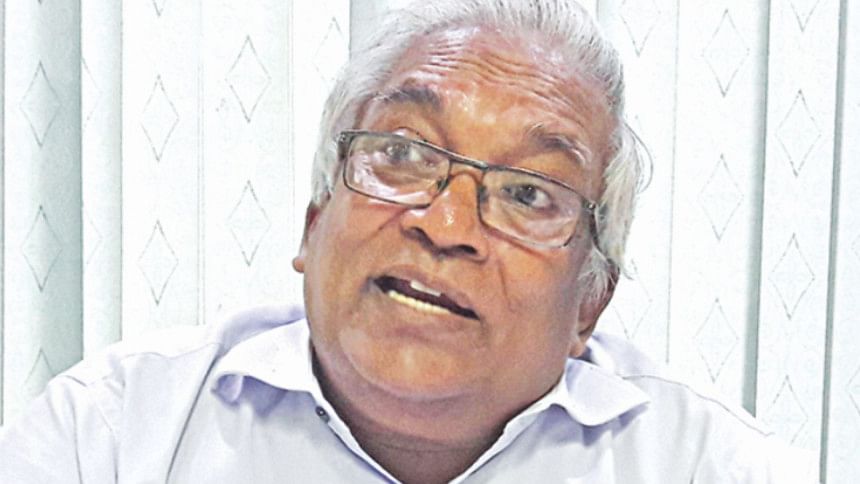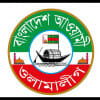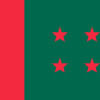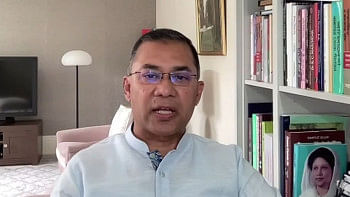'We're not vote bank of any party'

Bangladesh Hindu Bouddha Christian Oikya Parishad holds its grand rally today at the capital's Suhrawardy Udyan to press home its five-point demand ahead of the upcoming parliamentary elections. The platform has time and again voiced its concerns over the security of the minority people and placed various demands to the government. On the eve of the rally, The Daily Star's Wasim Bin Habib and Tuhin Shubhra Adhikary talk to the platform's General Secretary Rana Dasgupta to get an insight of the overall situation of the minority communities in Bangladesh
The Daily Star (TDS): At a recent press conference, your organisation has expressed concerns over the security of the minority communities as the national election is nearing. Why is it so? What is the present situation of the minority communities in Bangladesh?
Rana: After the assassination of Bangabandhu Sheikh Mujibur Rahman, a communal atmosphere had been created in the country due to the activities of all successive governments that came to power. When democracy was restored in the early 90s on the basis of the joint declaration of three alliances, we considered that to be a second victory after the 1971 Liberation War.
But unfortunately, we saw incitement of communal hatred in the election campaign of the first [parliamentary] election in 1991, yet again creating a communal atmosphere. And the party that came to power carried out torture and repression on the minority people for 27 straight days.
Similar incitements of communal hatred were also perpetrated before the 2001 elections. And we saw a continued repression on the minority communities during the five-year tenure of the BNP-led alliance government. There was an exception in the 2008 polls and we anticipated that such incidents will never repeat.
But that was not to be. Since 2013, there have been communal attacks over the war crimes trial. In almost all the elections -- be it national or local government -- in the last five years, we saw minority communities being attacked although most of the candidates in those elections were from the ruling Awami League. But regrettably, the state and the administration remained silent. In fact, no visible step has been taken by any political party or government against the perpetrators since 1991.
As the national election is approaching, we fear that the minority communities might again become the easy target of communal attacks.
TDS: The minority people are often considered a "vote bank" of the Awami League, a party that has been in power for about 10 years. Why does such a fear exist then?
Rana: The religious and ethnic minority communities in Bangladesh are not the vote bank of any political party. They were the victims of destruction, genocide and rape during the Liberation War in 1971. They were forced to leave the country. Most of the 1 crore refugees at that time were from the minority communities. Despite such sacrifices, they are sometimes considered to be trouble or danger in this independent Bangladesh. Still, the minorities cling to the Liberation War as the spirit of the war is something that is related with their existence.
Now in the politics dominated by two parties, the minorities think that they have no alternative except one party. When the Bangalee nationalism was replaced by Bangladeshi nationalism after the 1975 changeover, it was actually a replacement of religion-based Pakistani nationalism. So we are not the vote bank of any particular political party, they are in favour of the language-based nationalism.
The minority communities across the globe always favour comparatively democratic and secular forces. Even in India, the minorities have political alternatives. But because of the two-party political system in Bangladesh, the minorities have no alternative here.
Now the candidates for whom the minority people cast vote assume that the votes are their right. Some of them think that if the minority people stay in the country, they will get votes, and if the minorities leave the country, they will get their land. In contrast, some think if the minorities leave, it will save the country and the religion.
TDS: What is your expectation from the political parties and the state ahead of the elections? What is your suggestion?
Rana: Casting vote is a fundamental right of a citizen. We want that right to be ensured. We want that every member of the minority communities votes for his or her favourite candidate in a safe, free and peaceful atmosphere. We want that the political parties will not nominate anyone who, being a public representative, is or was communal, land grabber and either perpetrated repression on the minority communities or was involved directly or indirectly in anti-minority activities. If any such candidate is nominated, the minority community will not cast vote in that particular constituency.
TDS: Minority communities came under attack in several places, including Ramu (Cox's Bazar), Nasirnagar (Brahmanbaria) and Rangpur, over the last several years. Are the people in those places still in fear? Do you think the state ensured justice to the victims?
Rana: Not only in Ramu or Nasirnagar, such incidents took place in almost everywhere, especially after 2011. So a sense of fear still exists there. In the Ramu incident, around 15 cases were filed and two investigations -- one by police and other by the local administration -- were carried out. The administrative enquiry found involvement of local Awami League, BNP and Jamaat men. But police in its report excluded the names of the ruling party men. Several other locals told me that witnesses were not giving testimonies as the perpetrators remained off the hook and were threatening them.
Whenever such an incident takes place, cases are filed and a handful of people are arrested. But a few months later, police come up with a report admitting the occurrence of the incident but cites inadequate witnesses. The state still could not come out of the culture of impunity with regard to the minority repression. Therefore, the attackers are encouraged and the victims feel insecure.
TDS: Hindu priests, Buddhist monks and Christians became victims of targeted attacks by militants groups in 2015 and 2016. Do you think there is a change in the situation now?
Rana: Militancy is the highest form of fundamentalism and communalism. It's an ideology which has to be replaced by a counter ideology. But some political parties are doing politics along with the fanatics while others compromising with them to gain their interests, although all of them are talking against militancy. So militants are being encouraged and waiting for a chance. It's not possible to root out militancy only by the law enforcement agencies. If the country wants to get rid of the curse of militancy, we have to forge a unity like we did in 1971 and defeat fanaticism with a counter ideology. But no such step is visible.
TDS: Following the post-polls attack on minority community in 2001, the AL-led government had formed a judicial commission which came up with a report after a long investigation. What is the update on the matter?
Rana: Following a High Court directive, the Awami League government formed a judicial commission, led by retired district judge Mohammad Sahabuddin, in 2009. We along with many other organisations submitted information and documents on 15,000 incidents of minority repression after the 2001 polls. The committee submitted a report in January 2012 after investigating 5,000 incidents. We met Sahara Khatun and MK Alamgir (two successive home ministers) and demanded that the report is published and steps are taken in line the committee's recommendations to bring an end to the culture of impunity. But regrettably, the report was not published and no step was taken. The crimes were committed by the BNP-Jamaat men, but why did the Awami League remain tight-lipped when it came to taking actions against them? Isn't it giving an opportunity to the BNP-Jamaat? Isn't it a deal of criminalised politics?
In its report, the commission suggested taking action against many, including 25 ministers and lawmakers of the BNP-Jamaat alliance government, for their involvement. The recommendations of the committee must be implemented in order to end the culture of impunity.
TDS: The percentage of the minority population has declined since the country's liberation. What are the reasons behind it? Do you find any government's action to change such a trend?
Rana: In 1947, minority population constitutes 29.7 percent of the population of East Pakistan while the percentage came down to around 20 percent in 1971. It stood at 9.7 percent in 2011 as per the latest census.
The Pakistani rulers repressed the minority community and forced them to leave the country in order to turn Bangalees into minorities. After the 1975 changeover, the communities were victimised by the so-called Enemy Property Act and frequent attacks. In the name of settlement, the indigenous people were driven away from hill tracts. All such attacks and discriminations forced many minorities to leave the country. From a grand rally in December, 2015, we demanded formation of a parliamentary commission to find out the reason(s) behind the gradual decline in the minority population percentage since 1947 and recommended taking steps to stop the trend, but to no avail.
TDS: Several current MPs and ministers belong to the minority communities. How do you evaluate their roles to protect the interests of the communities?
Rana: The minority communities are utterly frustrated with the lawmakers. After the demise of veteran Awami League leader Suranjit Sengupta, the minority people find it hard to consider the 17 lawmakers from their communities to be their real friend. The minority people want that the lawmakers would speak for them in parliament. But the lawmakers are afraid of speaking out as they fear that they would fall down from the parties' good book. These lawmakers are playing the role of escapists, which is very painful.
TDS: What did the Oikya Parishad do in the last 30 years to protect the rights of the minority communities?
Rana: We are not a political party. We are a platform working with human rights issues. We have been able to make the minority people aware of their political and civic rights at the grassroots level. It is because of the Parishad that the minority issue has become a national issue and has drawn international attention. We have played key role in enacting or amending several important acts, including Vested Property Return Act and Hindu Marriage Registration Act. We can voice demands, pursue and forge unity on an issue and that is what we have been doing all these years.


 For all latest news, follow The Daily Star's Google News channel.
For all latest news, follow The Daily Star's Google News channel. 








Comments